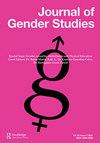“隔离之树”:疫情封锁期间的酷儿场所、性别二元和自拍中的“自我”
IF 1.5
3区 社会学
Q2 SOCIAL ISSUES
引用次数: 0
摘要
当许多酷儿空间关闭,社区转移到网络空间时,酷儿和性别不一致的社区、身体表达和身份会发生什么?在这篇文章中,我们批判性地反思了我们的合作项目bois of isolation(boi),这是Instagram中的一个平台,人们可以分享他们在新冠肺炎大流行期间同性恋性别二元的空间和过程的自拍照。我们想知道,在线社交媒体空间在多大程度上可以破坏规范的、二元化的性别认同,并提供重新想象自拍的方式。在数字资本主义中运作,自拍往往有助于在“与性别相适应”的地方传播和再现占主导地位的“理想”主观主义。然而,我们认为,通过像boi这样的干预措施,年轻人在社交媒体平台上开辟出异议和喘息的小空间,并在封锁期间创建各种形式的社区。通过质疑二元化性别的视觉表现,并质疑“自拍”中新自由主义的个性化“自我”,年轻人构建了表达和庆祝性别多样性和流动性的公共美学空间本文章由计算机程序翻译,如有差异,请以英文原文为准。
“Bois of Isolation”: queering place, gender binaries and the ‘self’ through selfies in pandemic lockdown
What happens to queer and gender-non-conforming community, bodily expression and identity when many queer spaces are closed and communities move to online spaces? In this article we critically reflect on our collaborative project bois of isolation (boi) - a platform within Instagram for people to share selfies of the spaces and processes through which they queer gender binaries during the COVID-19 pandemic. We ask to what extent online social media spaces can disrupt normative, binarised gender identity and provide ways of reimagining the selfie. Operating within digital capitalism, selfies often serve to circulate and reproduce dominant ‘desirable’ subjectivities in ‘gender appropriate’ places. However, we argue through interventions like boi young people carve out small spaces of dissent and respite in/ from social media platforms and create forms of community during lockdown. By queering the visual representations of binarised gender and questioning the neoliberal individualised ‘self’ in ‘selfies’, young people construct communal aesthetic spaces in which gender plurality and fluidity are expressed and celebrated
求助全文
通过发布文献求助,成功后即可免费获取论文全文。
去求助
来源期刊

Journal of Gender Studies
Multiple-
CiteScore
4.40
自引率
0.00%
发文量
52
期刊介绍:
The Journal of Gender Studies is an interdisciplinary journal which publishes articles relating to gender from a feminist perspective covering a wide range of subject areas including the Social and Natural Sciences, Arts and Popular Culture. Reviews of books and details of forthcoming conferences are also included. The Journal of Gender Studies seeks articles from international sources and aims to take account of a diversity of cultural backgrounds and differences in sexual orientation. It encourages contributions which focus on the experiences of both women and men and welcomes articles, written from a feminist perspective, relating to femininity and masculinity and to the social constructions of relationships between men and women.
 求助内容:
求助内容: 应助结果提醒方式:
应助结果提醒方式:


